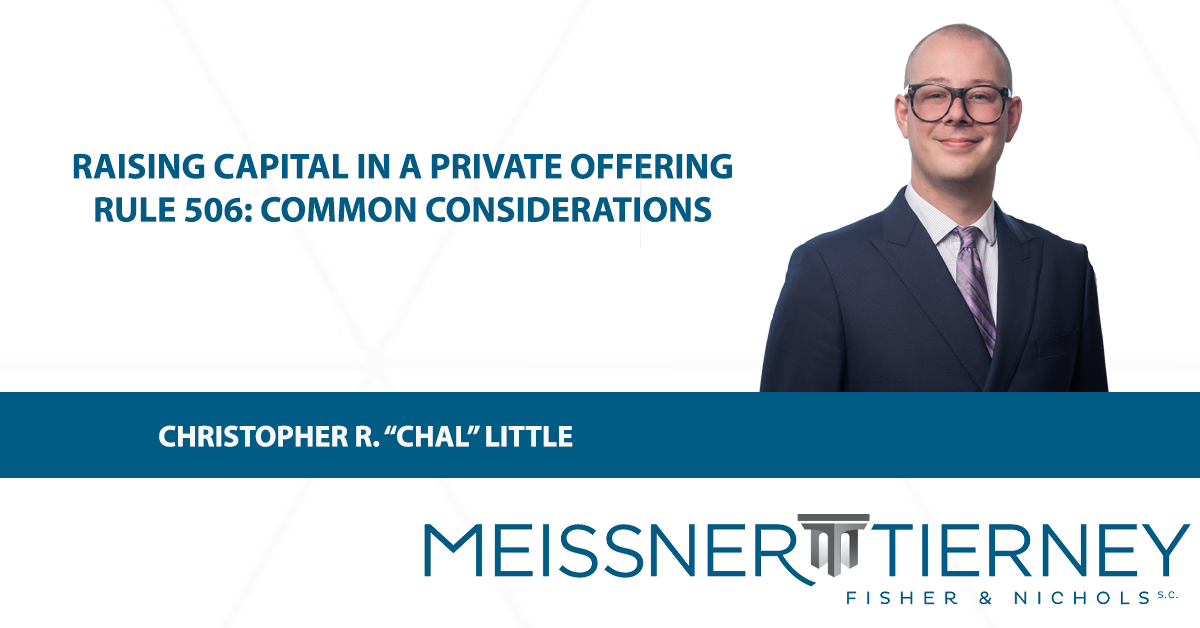NOTE: This article is intended only as a general summary of certain aspects of Rules under Regulation D and their potential applicability and usefulness in raising capital. This article is not, and is not an adequate substitute for, legal advice.
When closely held businesses need additional capital, they have several options. One of those options is raising capital from additional investors. A common way closely held businesses raise capital from additional investors is through a private offering of the business’ securities. There are several methods for going about a private offering, one of which is through the use of Regulation D, consisting of Rules 501 through 508, promulgated by the U.S. Securities and Exchange Commission (the “SEC”) under the federal Securities Act of 1933.
Securities Regulation Generally
First, a bit of general background for those unfamiliar with the federal and state securities laws. Federal and state law each have their own regime for regulating the offer and sale of securities. Any person—whether an individual or business entity—who offers securities for sale to any other person (commonly called an “offeror” or if an entity that is offering its own securities, an “issuer” of those securities) generally must comply with both the federal and state securities laws.
An offer of securities made not in compliance with the securities laws can result in steep penalties. For example, a purchaser may have the right to a refund of the full amount of the investment or an offeror might be permanently prohibited from any future participation in any subsequent offer, sale, or purchase of securities or career substantially involved in the facilitation of same. Accordingly, full compliance with the securities laws is critical to a successful capital raise.
Unless an exemption applies, the securities laws require the filing of a registration statement, which includes substantial statements and disclosures, at the federal and/or state level prior to an offering of securities to any person. Filing a full registration statement can be an arduous and costly process. Luckily, the securities laws provide myriad exemptions from those requirements. Although such exemptions generally mandate strict compliance with requirements of their own, they are often less burdensome and less costly to comply with than the registration requirements.
Even so, failure to properly comply with an exemption can cause an offeror to be subject to the same penalties for non-compliance as a failure to register, so care should be taken to follow the exemption rules to the letter. In addition, compliance with the federal rules does not necessarily constitute compliance with state securities laws (depending on the state in which the offer is made and/or purchasers reside). Accordingly, care must be taken to coordinate state and federal exemption requirements to ensure full compliance both at the state and federal levels.
Rule 506(c) of Regulation D
As previously mentioned, Regulation D consists of a set of rules pursuant to which an issuer may conduct limited offers and sales of securities without having to register the offering with the SEC under the Securities Act. Rule 506, together with the corresponding exemptions under state securities laws (state-depending), is the most frequently used “safe harbor” under Regulation D and one of the most important means of raising capital in the U.S. Rule 506 provides two frameworks around which issuers may structure offerings, its subsections (b) and (c). Presently, our discussion involves the broader offering, Rule 506(c).
Rule 506(c) permits issuers to raise an unlimited amount of capital (other exemptions generally have dollar limits) from an unlimited number of investors (again, others have limits) so long as all investors to whom the offering is made are “accredited investors” (as defined in Rule 501 of Regulation D). If the issuer complies with Rule 506(c), the issuer need not also register the offering with the SEC, though it still must file the appropriate Form D with the SEC no later than 15 calendar days after the first sale of securities in the offering and make the appropriate corresponding state law filings, if any.
In a 506(c) offering, an issuer must also take reasonable steps to verify the accredited investor status of the purchasers. Whether the specific verification steps an issuer takes are reasonable is an objective, principles-based determination. This determination generally should be based on the particular facts and circumstances of each purchaser and transaction. Rule 506(c) states that an issuer should consider factors which include the nature of the purchaser, the type of accredited investor the purchaser claims to be, the amount and type of information the issuer has about the purchaser, and the nature and terms of the offering.
Under this principles-based, facts-and-circumstances approach, the more likely it appears that a prospective purchaser qualifies as an accredited investor, the fewer steps the issuer would have to take to verify accredited investor status. For example, if the terms of the offering require a minimum investment amount which is quite high and the purchaser is able to meet those terms without third-party financing, then the likelihood of that purchaser satisfying the definition of accredited investor may be so high that, absent red flags to the contrary, it may be reasonable for the issuer to take fewer steps to verify accredited investor status (though obtaining additional information about the purchaser is always advisable and particularly under the current tax laws, necessary).
In addition to permitting an unlimited number of dollars raised and accredited investors involved, Rule 506(c) makes it easier for issuers to find investors by allowing issuers to make general solicitations with respect to private sales of securities (including via the Internet and social media), activities which are generally prohibited in any other exempt private offering. This can be particularly useful where issuers intend to offer securities to individuals with whom the issuer has no prior existing relationship.
However, such general solicitation is permitted in connection with a private offering under Rule 506(c) only if all of the purchasers of the securities are accredited investors, as defined in Rule 501 of Regulation D; the issuer takes reasonable steps to verify that all of the purchasers are accredited investors; and all of the other applicable terms and conditions of Regulation D are satisfied (such as restrictions on integration, resale, and participation by certain “bad actors” described in the regulations). Caution, too, that another private offering exemption may not be available if an issuer fails to comply fully with Rule 506(c) (the SEC has noted that, other than the explicit permission granted in Rule 506(c), public advertising will continue to be incompatible with a claim of exemption from registration under other private offering exemptions). So, an issuer that utilizes general solicitation but fails to comply fully with Rule 506(c) might lose exemption altogether, fail to meet the registration requirements (because the issuer was relying on the exemption instead), and be subject to sanction or worse under the securities laws.
Lastly, recall that compliance with Rule 506(c) does not necessarily (and most likely will not) constitute compliance with state securities laws. Prospective offerors should be careful to ensure compliance with both the federal and state rules prior to initiation of any offer or issue or any sort of solicitation with respect thereto.
If you are considering raising capital and need the assistance of experienced counsel, contact us.






